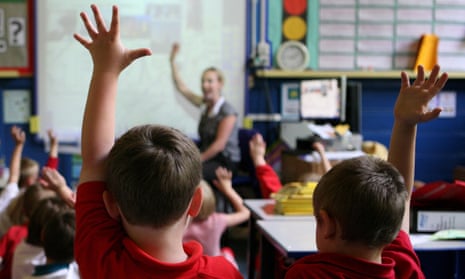Boys starting school are being outperformed by their female classmates, with more than a third failing to reach the expected level in writing and a quarter struggling with numbers, government figures show.
The gender gap among the youngest schoolchildren has narrowed marginally, but girls continue to lead the way in all early learning goals, with 74.3% achieving the expected level of development compared with 58.6% of boys.
For those achieving a good level of development, the gender gap has reduced from 16.3 percentage points in 2014 to 15.6 percentage points this year, but early years experts warned that it remained “substantial” and have called for action to alter the trend.
Publishing the data on Tuesday, the Department for Education said results showed that more five-year-olds than ever before were achieving the expected standards in maths and literacy, with more than two-thirds making good progress.
It said an extra 38,600 five-year-olds were reaching the expected level of development in maths and literacy, as well as in communication and language, personal, social, physical and emotional development.
However, critics pointed out that one in five children still starts school without vital skills. Gareth Jenkins, director of UK poverty at the charity Save the Children, said: “Today’s figures show that despite progress, one in five children still arrive at school lacking the skills they need to learn and thrive.
“Unless we act now to boost the quality of early years education, it will be a decade or more before we see every five-year-old arriving at school ready to learn – with thousands of children suffering as a consequence.
“The evidence shows it’s the poorest children who are more likely to start primary school already behind, and who are then much more likely to struggle in school, and in life.”
Five-year-olds are assessed in the summer term of reception year against the early years foundation (EYFS) profile, a framework to check readiness for school. Children are expected to be able to count to 20, describe weight and shapes in everyday language, write their own name and read simple sentences, as well as play confidently with friends.
According to the government, 70% of children achieved at least the expected level in all early learning goals in literacy and 75% in maths; the attainment gap between the lowest-attaining children and their classmates has gone down from 33.9% last year to 32.1% this year.
An analysis of the figures relating to gender reveal that 63.6% of boys reached at least the expected level in writing, compared with 78.3% of girls – a gap of 14.7 percentage points, meaning approximately 122,060 five-year-old boys could not write simple sentences that could be read by others, with some words spelled correctly.
Boys did better in reading, with 70.6% achieving at least the expected level, but 81.9% of girls reached this level, a gap of 11.3 percentage points. And in arithmetic, 73.6% of boys reached at least the expected level of development, compared with 81.4% of girls.
The education and childcare minister, Sam Gyimah, said: “It is great news that more children than ever before are achieving the expected level of development in the early years, because parents should be confident that while their children are out of their care, they’re not only happy and having fun, but at the same time developing important skills – building confidence with numbers and letters – to ensure they fulfil their potential.”
Neil Leitch, the chief executive of the Pre-school Learning Alliance charity, also welcomed the results, but urged action on the enduring gender gap. “While we are pleased to see that the gap between boys and girls is continuing to narrow, the difference in outcomes remains significant and so clearly there is more work to be done to tackle this trend.”

Comments (…)
Sign in or create your Guardian account to join the discussion